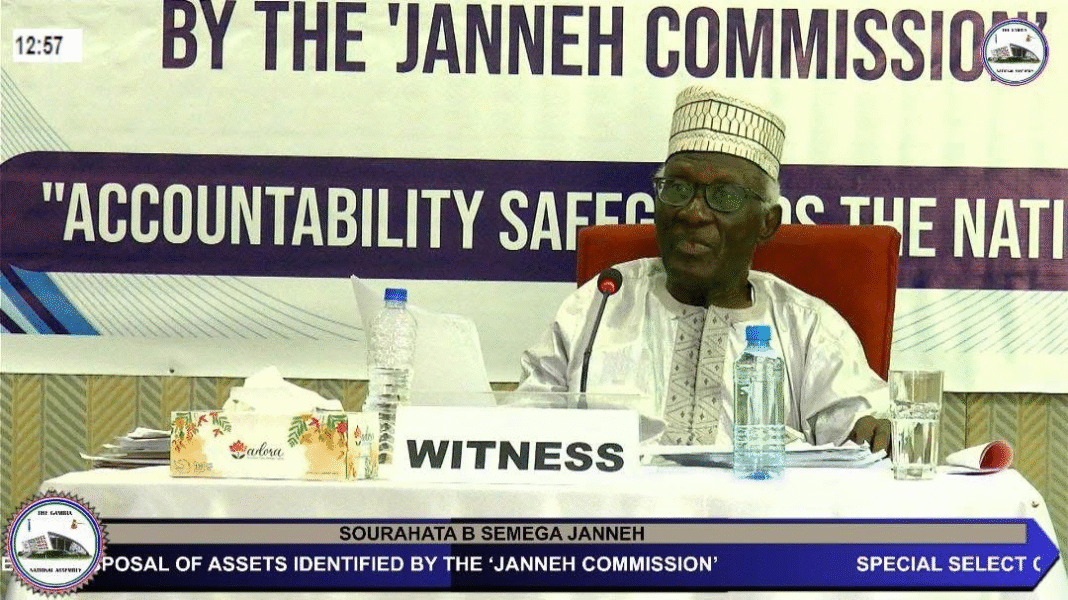Former Janneh Commission head Surahata Janneh testified before the National Assembly Select Committee on Tuesday about the sale and disposition of former President Yahya Jammeh’s properties.
Lead counsel Lamin M. Dibba asked Mr. Janneh throughout the hearing if he had been contacted by any government ministry before the committee was formed. Janneh replied that he was unable to remember any such correspondence.
Janneh said he had already addressed his desire to serve as the commission’s chairperson with the Attorney General, adding, “Because what I consider to be the establishment of the commission is the issuance of the commission by the President of the Republic of the Gambia.”
In response to a question from counsel on who started the talk about the commission, the witness stated that he knew Attorney General Ba Tambadou well and that the attorney general started the conversation.
The counsel then asked, “After establishing the commission, did you undergo any briefing from the government as to the expectations of the commission?”
The witness attested that he and two of his coworkers did receive a briefing.
“I want to make it clear here, maybe we can say, big commission, understanding that the name is very long. Now I want to make it clear because there is a great misunderstanding. That is why I want to make it very clear that you have a commission, that you have a commission of inquiry, and that commission of inquiry has only three commissioners, and that can be verified,” he said.
According to the witness, a document known as SBS 2 can be used to confirm the Janneh Commission’s makeup. The witness claims that the document makes it very evident that Bai Mass Saine, Abiosseh George, and Surahata Janneh make up the commission. He made it clear that he only acknowledges these people as commissioners.
The witness further revealed that the Attorney General and the witness met in the AG’s office on multiple occasions. The commissioners participated in some of the meetings, but others featured people who helped the commission with its job, like the secretary and lead counsel. He claimed that one meeting in particular was more concerned with preliminary discussions than the commission’s makeup.
He explained that the Janneh Commission was not specifically established by any laws. The Commission of Inquiry Act, which he defined as a broad structure for all commissions of inquiry, instead served as the commission’s operating framework. He clarified that the Constitution, the Commission of Inquiry Act, and the Terms of Reference (TOR) were the three main documents that governed their task.
The witness also stated that in order to decide how to proceed under the given legal framework, the three commissioners, the secretary, the lead counsel, and the Solicitor General—whose name he was unable to remember—had to convene.
We were informed that we would not have our own budget. He said that the TRCC has its own budget, that we were not allowed to spend any money, and that we had to rely entirely on the government for all of our expenditures.
Counsel told the witness that the committee wanted to know if the commission’s duties and scope were covered in such depth during that discussion that they matched the terms stated in the 2017 Legal Notice.
This was not exactly the situation, the witness retorted, adding that everything hinged on the three devices he had indicated earlier.
“How did you interpret your role as the chairperson?” inquired Counsel Dibba.
The witness responded by directing the committee to a document that said that the chairperson’s unique responsibility was limited to serving as the commission’s chair. He clarified that, although it was not mentioned in the contract specifically, the chairperson would typically have a casting vote in the case of a tie, as is typical in many organizations.
He made it clear that the chairperson’s responsibility was restricted to chairing the panel and that all members were equal.
“So we decided to act by consensus and not by voting. And I will tell you that I cannot remember once when we disagree,“ he remarked.
Counsel Dibba asked the witness if he was aware of a lawsuit that included Yahya AJJ Jammeh and the Attorney General.
The witness said that he was unable to remember the case and requested more information. Counsel then gave him an explanation of the suit’s nature.
The witness was also asked to clarify the difference between the commission’s mandate and the Terms of Reference (TOR).
He responded that Section 202 of the Constitution lays forth the commission’s main mandate.


